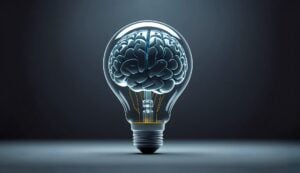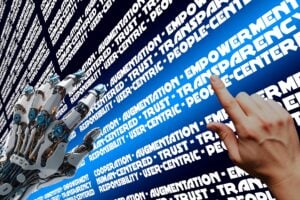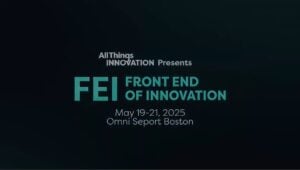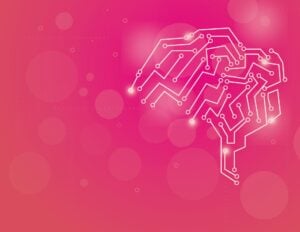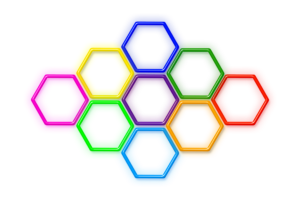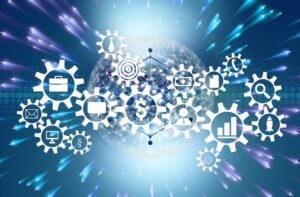Welcome to the Collective
Collective intelligence can come in many shapes and sizes and is not a one-size-fits-all solution. This is largely determined by group composition and group dynamics. Atlan, in its blog, “Collective Intelligence: What It Is & 5 Reasons Why It Matters!” looks at the history of collective intelligence and pinpoints four types of the concept. “Understanding these types can help us harness the collective’s full problem-solving and creative potential,” notes Atlan.
1. Human-based collective intelligence: This refers to the gathering and synthesis of knowledge, expertise, and resources from multiple human participants to create a form of intelligence greater than any individual could produce alone. It is often facilitated through face-to-face interactions, virtual platforms, or coordinated activities and focuses on leveraging the diverse skills and perspectives of its participants. This can include crowdsourcing, the Delphi method (a panel of experts), and open innovation.
2. Computer-based collective intelligence: This represents the convergence of computational power and large-scale data analysis to produce intelligence or problem-solving capabilities that are beyond the scope of individual agents—human or machine. This could include artificial intelligence (AI), big data analytics, and multi-agent systems.
3. Hybrid systems: In the context of collective intelligence, this refer to the integrative frameworks that combine both human and computer-based intelligence to achieve problem-solving capabilities, creativity, and decision-making. This could range from human-in-the-loop systems, AI-augmented human networks and multi-agent systems.
4. Natural collective intelligence: This type features simple rules yet complex behaviors. For instance, a flock of birds can display complex aerobatic maneuvers through basic behaviors. Local interactions, and feedback loops, also can sustain collective intelligence interactions.
Intelligence Gathering
In “Choosing Open Innovation for A Positive Collaboration,” All Things Innovation looked at one avenue of collective intelligence. Creating new pathways to growth, open innovation can be a key tactic that a company can use to open new doors, spark ideas and foster positive collaborations. Rather than just traditionally rely on the company’s internal resources for research and development, the open innovation mind-set promotes a more external, open-minded approach to developing processes, products and services.
In “Harnessing the Collective Super Mind to Unleash Innovation,” we also looked at the concept of the collective super mind. As Innovation Director, FIFA World Cup 2022, Oscar Barranco Liebana had a pretty tall order—to manage innovation with the goal to deliver an amazing tournament experience in Qatar. At FEI, All Things Innovation’s Seth Adler got a chance to talk with Liebana about the innovation initiatives and processes behind the tournament, the concept of the super mind and more.
Open to Change
In the context of innovation, leveraging collective intelligence can yield numerous benefits. According to ChatGPT, here are ten key advantages:
- Diverse Perspectives: Collective intelligence brings together individuals with diverse backgrounds, experiences, and expertise. This diversity fosters a wide range of perspectives, which can lead to more creative and innovative solutions.
- Problem Solving: Collaborative efforts allow for the pooling of various problem-solving approaches. Different individuals may have unique insights and skills that contribute to a more comprehensive understanding of a problem and, consequently, more effective solutions.
- Accelerated Learning: Knowledge sharing and collaboration within a group can lead to accelerated learning. Individuals can learn from each other’s experiences, successes, and failures, promoting continuous improvement and faster adaptation to changing circumstances.
- Increased Creativity: The combination of different viewpoints and ideas often sparks creativity. By encouraging open dialogue and collaboration, collective intelligence can generate novel and imaginative solutions to complex problems.
- Efficient Resource Utilization: Collective intelligence enables the efficient use of resources by tapping into the expertise of individuals within a group. This can lead to optimized decision-making and resource allocation.
- Enhanced Problem Identification: A diverse group is better equipped to identify potential challenges and opportunities. The collective intelligence of a team can help in identifying issues that may not be immediately apparent to individual members.
- Adaptability: Innovation often requires adaptability to changing circumstances. Collective intelligence promotes a dynamic and flexible approach to problem-solving, as diverse perspectives contribute to a more resilient and adaptable team.
- Knowledge Transfer: Through collaboration, knowledge is shared and transferred among team members. This not only contributes to individual development but also ensures that valuable insights are not siloed within the organization.
- Increased Accountability: In a collaborative environment, individuals often feel a sense of accountability to the group. This can lead to increased motivation and a higher level of commitment to the success of the innovation process.
- Greater Acceptance of Change: When individuals are part of the innovation process from the beginning, they are more likely to accept and embrace changes resulting from that process. Collective intelligence can contribute to a positive and inclusive culture that supports innovation.
The Dynamics of Humans & Machines
We live in an increasingly complex and interconnected world. Transforming problem solving, decision-making and innovation to a group experience can be key to collective intelligence benefits and the potential for this kind of sharing and collaboration in the future. This can be applied to important areas such as business and management, science and research, social systems and governance, healthcare, technology and data science.
As Atlan notes in its blog, “As we face monumental challenges like climate change, political polarization, and global health crises, the capability to harness the wisdom and skills of diverse groups—both human and machine—becomes not just beneficial but essential.”
Video courtesy of Big Think
Contributor
-

Matthew Kramer is the Digital Editor for All Things Insights & All Things Innovation. He has over 20 years of experience working in publishing and media companies, on a variety of business-to-business publications, websites and trade shows.
View all posts






